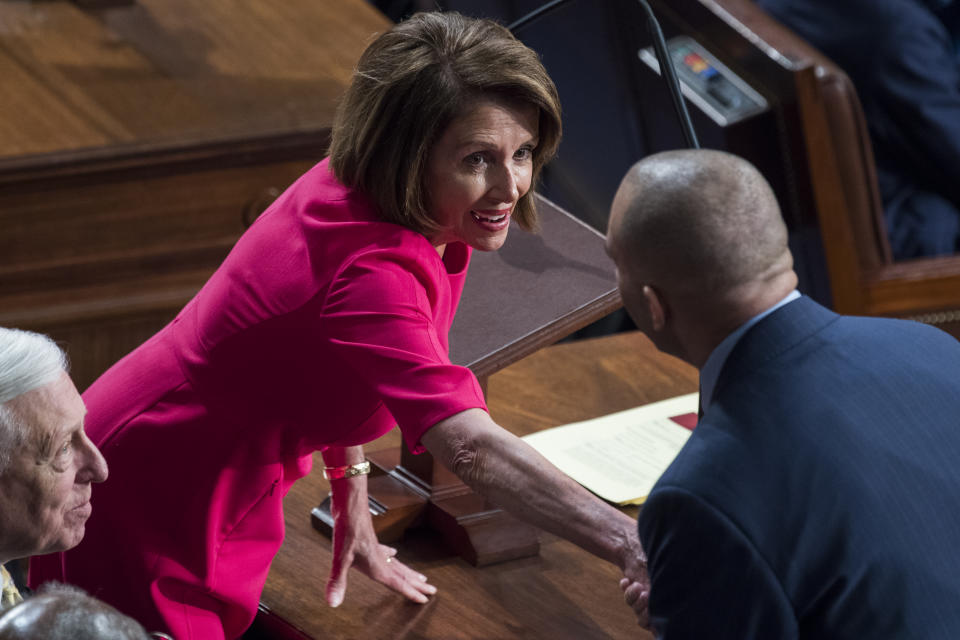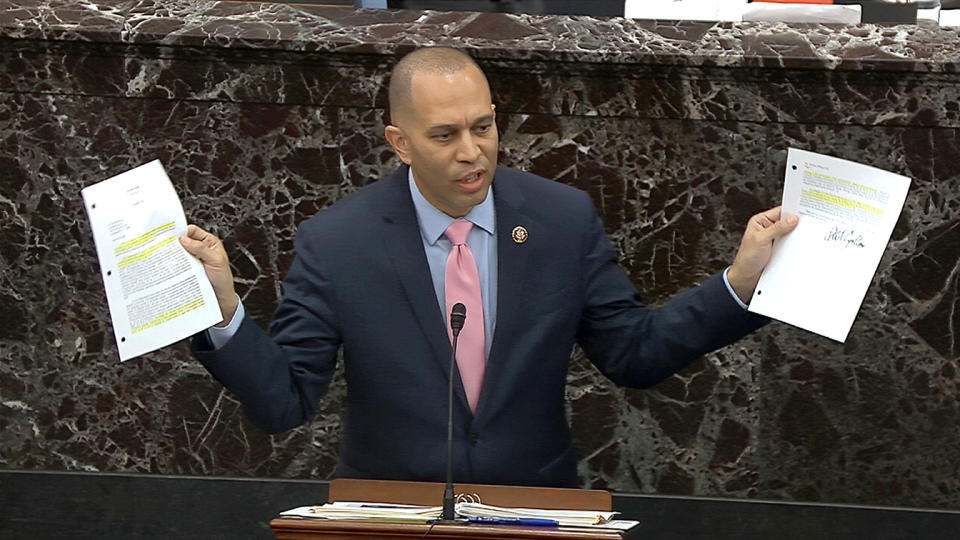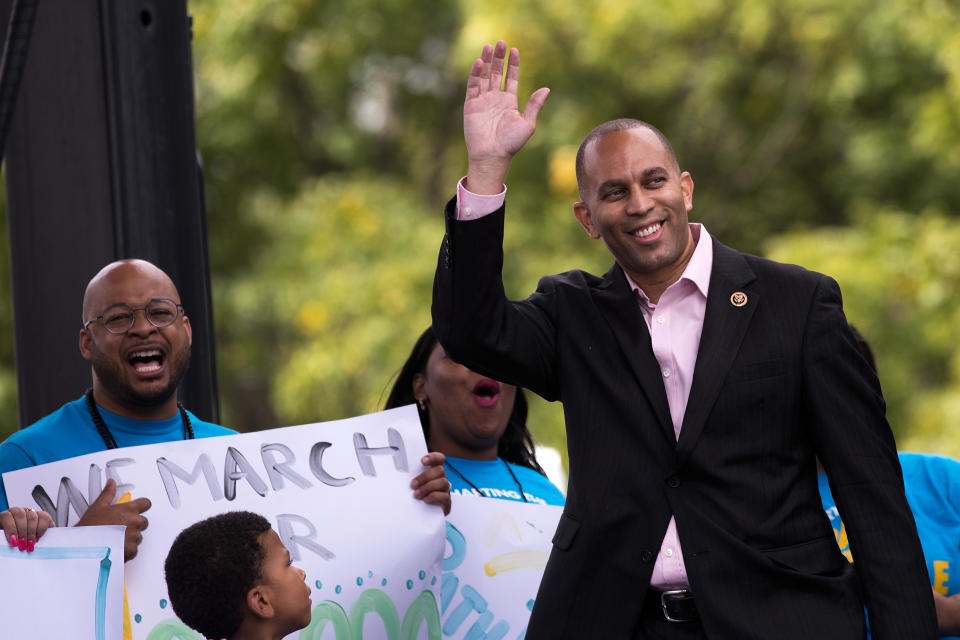From coronavirus to impeachment, Hakeem Jeffries says he's focused on representing Brooklyn to the fullest
Rep. Hakeem Jeffries, a 49-year-old Democrat from Brooklyn, just might be the next speaker of the House. In the meantime, however, there’s a pandemic to deal with.
On Sunday night, Jeffries hosted a coronavirus “virtual town hall” on Facebook, where he was joined by medical experts and other local officials. Jeffries provided the audience with information about how the federal and local governments are responding to the pandemic, which has hit New York City particularly hard. He also gave advice on best practices for staying safe at home.
“Maintain a healthy social distancing practice. ... Wash your hands, wash your hands, wash your hands,” Jeffries said. “We’ll continue to make ourselves available, and we’re going to get through this together.”
Since he was elected to the House in 2012, Jeffries has made it a point to regularly host neighborhood town halls and “Congress on your corner” events to maintain a physical presence on the streets of his New York City district, which includes parts of his native Brooklyn and a small sliver of Queens.

Now that hands-on approach must be modified for the coronavirus era. At the end of his virtual town hall, Jeffries said he is planning similar events via conference call and online. As of Friday morning, there were 4,408 confirmed cases of the virus in New York City. The city’s mayor, Bill de Blasio, is pushing for a “shelter in place” order that would effectively quarantine most New Yorkers inside their homes. In the meantime, New York Gov. Andrew Cuomo announced Friday morning that he was banning “all nonessential gatherings of individuals of any size for any reason.”
The new rules prohibit Jeffries from practicing the retail politics — the interactions with constituents up close and in person — that have helped make him one of the city’s most prominent politicians. In an extensive conversation with Yahoo News late last month, he talked about why it’s a priority for him “to be visible, to be available” and “to be present” in his district.
Jeffries also discussed the persistent speculation that he could be the next speaker of the House, his concerns about rampant gentrification and his experiences working with President Trump’s White House.
Jeffries got his start in politics when he was elected to the New York State Assembly in 2006 after years working as a lawyer. He believes too many officials only go out and engage with their constituents during election season.
“From the very beginning … I made the determination that I wanted to try to approximate the same level of effort and connectivity that candidates deploy when campaigning, when it’s time to govern,” Jeffries said. “Many people rightly conclude that it seems as if we only see individuals when they’re seeking office.”
Even before the coronavirus pandemic made this kind of up-close-and-personal politics a thing of the past, serving on Capitol Hill made it harder for Jeffries to spend a lot of time with constituents. But his wife and children have remained in Brooklyn.
“I’m in Washington, but I’m there no longer than I have to be. I don’t linger in Washington. ... The center of gravity has to be the district you represent,” Jeffries said. “If you align your family’s location with the district you serve, then you have the dual incentive to be on the ground, both to see your family and to be working on the ground on behalf of the people that you represent.”

Since coming to Washington, Jeffries has quickly risen in the ranks. He is now the fifth-ranked Democrat in the House, and he had a prominent role as an impeachment manager earlier this year. He is also regularly cited as a potential successor to House Speaker Nancy Pelosi, although he insists he has never considered taking on the role.
“That’s not something I’ve given any thought to, because there is one speaker at a time, and we have an extraordinary one in Nancy D’Alessandro Pelosi,” he said. “I’ve got a job to do as chair of the House Democratic Caucus. And the best thing I can do is to do that job to the best of my ability and keep the focus on serving the people of the Eighth Congressional District.”
Jeffries makes a point of stressing his loyalty to Pelosi, who turns 80 next week. He calls her a “speaker for the ages,” particularly for her ability to build a coalition that includes both an energetic progressive wing and many moderates in swing districts.
“She’s a progressive at heart, representing one of the most progressive districts in the country, anchored in San Francisco,” Jeffries said, later adding, “She’s led us into the majority, not once but twice, by picking up tough districts, often won by ... pragmatic, sort of moderate Democratic candidates who go on to be moderate Democratic members of Congress.”
Jeffries represents one of the most Democratic districts in the country but says he shares Pelosi’s willingness to embrace more moderate members.
“I’m a Nancy Pelosi Democrat. I’m a Barack Obama Democrat. I’m a progressive, pragmatic progressive,” he said.

But what Jeffries calls pragmatism has garnered criticism from the Democratic Party’s left wing. Shortly after Rep. Alexandria Ocasio-Cortez was elected in 2018, a group closely allied with the congresswoman discussed recruiting a primary challenger to run against Jeffries.
At the time, he responded to the potential of a primary threat with a quote from his favorite rapper, Brooklyn’s Notorious B.I.G.
“Spread love, it’s the Brooklyn way,” Jeffries said.
Ocasio-Cortez’s reelection campaign did not respond to a request for comment on this story. Jeffries insisted he welcomes feedback from staunch progressives and more moderate members of the party.
“Every member of the Democratic caucus has something meaningful to add, and so I embraced that. Internal critiques that test the strength of any arguments we’re making in the public domain only serve to make the person making the arguments stronger.”
Despite Jeffries’s various denials, his status as a possible successor to Pelosi is clearly on the minds of his allies and constituents. During his annual “State of the District” speech in Brooklyn last month, he was introduced by a marching band and state Attorney General Tish James, who described him as “a heartbeat away from being the next speaker of the United States.”

People in the crowd, which packed a college basketball gym, were well aware of the potential that Jeffries could become the first African-American speaker of the House in U.S. history. Max Brown, who lives in the Brooklyn neighborhood of East New York, described the prospect as “inspiring.”
“I know he’s going to make it,” Brown said. “It’s just a matter of time. He truly has worked his way up, and he deserves it.”
Jeffries’s national profile got a boost from his recent stint as one of the House members who managed Trump’s impeachment trial in the Senate. Jeffries is a former litigator, and his sharp questioning led to a few breakout moments during the impeachment proceedings and other hearings with administration officials.
As the trial kicked off in January, Jeffries once again quoted the Notorious B.I.G. when Trump’s lawyers questioned why the president was being impeached.
“We are here, sir, because President Trump corruptly abused his power and then he tried to cover it up,” Jeffries said. “And we are here, sir, to follow the facts, follow the law, be guided by the Constitution and present the truth to the American people. That is why we are here. … And if you don’t know, now you know.”
Jeffries generally peppers his remarks with a mix of references to constitutional law, rap lyrics, pop culture and Bible verses. He grew up as a Baptist, and his speeches show it. They’re a theatrical and rhythmic blend of patriotism and punch lines, like a recent speech where he railed against Trump by invoking both history and the HBO series “Game of Thrones.”
“The framers of the Constitution did not want a king. They did not want a monarch. They did not want a dictator. They wanted a democracy,” said Jeffries. “House Democrats will continue to defend our democracy no matter what it takes. We will never bend the knee to Donald J. Trump.”

For Jeffries, serving as one of the first impeachment managers of color was “meaningful.” He describes quoting Biggie lyrics on the Senate floor as part of imbuing his work with an “authentic connection” to his home.
“For me, as someone who grew up in Brooklyn, bringing that to life in different ways is consistent with being the best possible representative of the Eighth Congressional District. So from time to time, that may involve quoting scripture, having grown up in the Cornerstone Baptist Church in Bedford Stuyvesant, and from time to time that may involve quoting the late great Christopher Wallace,” he said, using the Notorious B.I.G.’s given name.
And while he’s actively weighing in on national issues, Jeffries says his constituents are most concerned with a growing lack of affordable places to live. Housing costs have gone up more than a third in Brooklyn since he took office in 2013, a change largely brought about by the borough’s rampant gentrification.
For Jeffries, watching the process has been “painful” because it involves people who weathered New York’s high crime in the ’70s and ’80s being priced out.
“You’ve got some communities that were littered with broken glass and crack vials that are now filled with bike lanes and sidewalk cafés,” Jeffries said. “We embrace the progress, but it cannot be that those who were there who helped transform the communities ... are being pushed out and can’t enjoy the transformation.”
Jeffries described the “affordable housing crisis” as “so intense in many parts of the country and growing in intensity in other parts.” To address it, he wants to see “an all-hands-on-deck approach” that involves “federal reengagement” in public, senior and middle-income housing “in a manner previously unseen.” His vision for that includes “strengthening the Low-Income Housing Tax Credit” and recognizing “housing as a human right.”
While he’s highly critical of the president, Jeffries was a key player on one of the rare pieces of bipartisan legislation that has emerged in Trump’s Washington: the First Step Act, which will allow some nonviolent convicts in the federal prison system to leave prison earlier.
Jeffries said he is “thankful for the leadership” the president’s son-in-law and senior adviser Jared Kushner showed as that criminal justice reform was crafted. Jeffries praised Kushner, whose father spent time in federal prison, as “personally authentic” on the issue of “our overcriminalization problem in America.”
But Jeffries said he didn’t meet Trump once during the process, and he offered the president no similar compliments.
“All the negotiations that took place were led by Jared Kushner, and I never had the conversation one way or the other with President Trump on this issue,” Jeffries said. He added: “It’s clear to me that President Trump is authentically committed to President Trump. And beyond that, it’s hard to tell.”
Jeffries and Trump have never crossed paths in New York City either.
“By the time I transitioned from the state Assembly into the congressional delegation, he had already lost his mind, at least as it related to leading the birtherism movement,” Jeffries said of Trump.
And Jeffries wouldn’t even credit Trump, a Queens native, for having some Big Apple style.
“We’re not really feeling Donald Trump as a New Yorker at this particular point in time. I mean, he’s brash, and New Yorkers in part have a reputation for being brash. He’s a New Yorker,” said Jeffries. “Thankfully, he’s not a Brooklynite.”

_____
Read more from Yahoo News:


